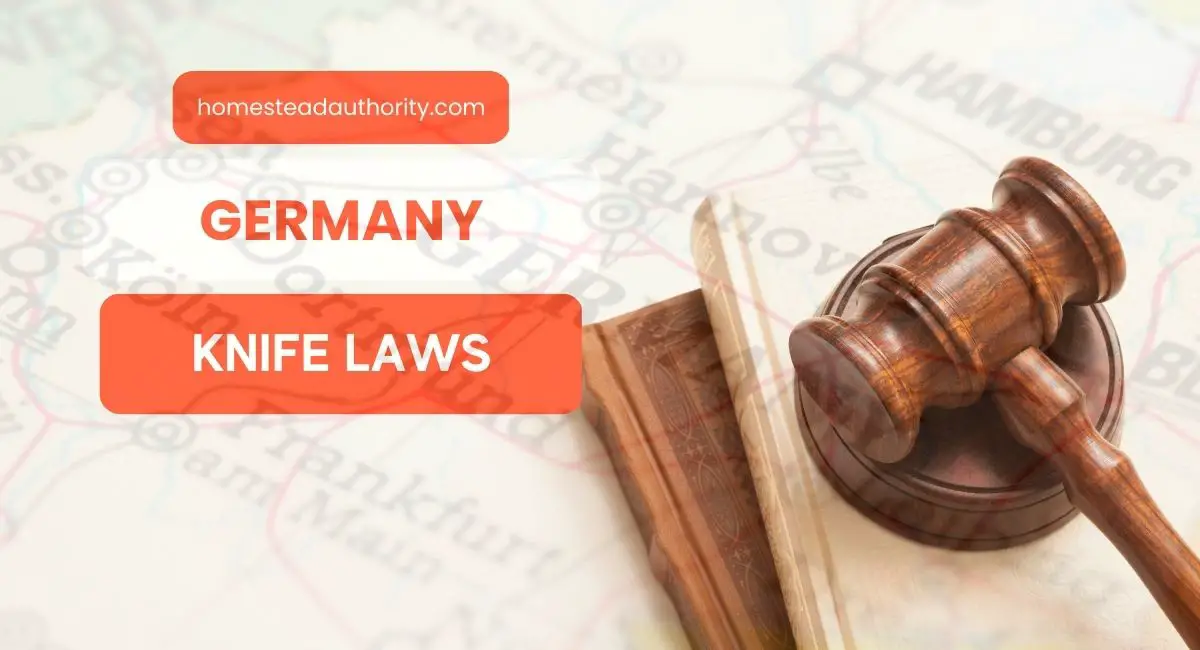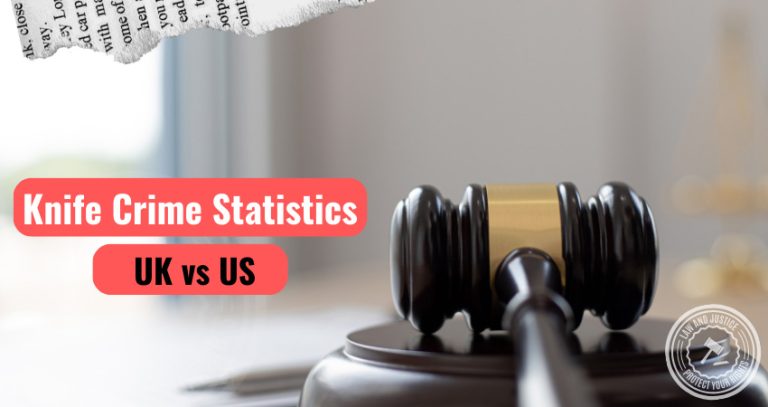Knife Laws In Germany – What You Should Know
For many people around the world, owning and carrying knives is normal. Although knives are generally used for cooking and other harmless activities, they can also be dangerous weapons. Hence, countries like Germany have laws prohibiting certain types of knives and where you can carry them.
To be a knife owner, you should familiarize yourself with a country’s knife laws to avoid legal issues. Germany’s knife laws completely ban certain types of knives, such as butterfly knives. The regulations also allow you to own other knives, like folding knives, but not carry them.
This article will explore Germany knife laws, list what types of knives are banned, and the penalties for breaking these laws. It will also examine the exceptions in the law that can allow you to carry prohibited knives.
Quick Legal Facts
- Federal preemption: Yes
- Schools: Carrying knives in schools and other educational institutions is prohibited
- Critical dimensions: None noted
List Of Illegal Knives In Germany
In Germany, many types of knives are illegal, and you’re not allowed to own, import, sell, carry, or manufacture them. Examples of knives that are completely banned in Deutschland include;
- Switchblades like balisongs (also known as butterfly knives) and OTF (out-of-the-front) knives
- Gravity Knives
- Dirk knives
- Thrusting knives such as the dirk, poignard, and the bowie knife
- Throwing stars and stabbing knives
- Arkansas toothpick
- Ballistic knives
- Fist knives
- Push daggers and gimlet knives
- Double-edged knives with cross guards designed for knife fighting, such as the dagger (except when used in professional activities)
Illegality Based On Concealed And Open Knives
Under German law, it is illegal to carry concealed knives. Examples of knives that are banned because of their concealed nature include;
- Pan knives
- Air gauge knives
- Lipstick knives
- Zobi-tsues
- Belt buckle knives
In What Places Are Knives Illegal To Carry?
Can you carry a knife in car in Germany? That may depend on where you are going. German knife laws prohibit people from carrying illegal knives in certain places to prevent public safety threats. These areas include;
- In or around train and bus stations
- Shopping centers
- Hotels, movies theaters, and cinemas
- Festivals, concerts, and sporting events
- Parks and courthouses
- Schools and other educational institutions
Which Knives Are Legal To Own But Illegal To Carry?
In Germany, there are some knives that you can buy and own as long as you don’t carry them in public areas. They include;
- Automatic knives with a single sharp edge and up to 3.34 inches (8.5 cm) blade length
- Karambit knives
- Switchblade stilettos
- Throwing knives with blade lengths less than 4.7 inches
- Daggers
- Cane stick knives
- Folder knives whose blade lock mechanism can be opened with one hand
- Semi-automatic knives with blade lock mechanism
- Fixed double-edged knives of all sizes
- Fixed single-edge blades longer than 4.72 inches
While it may be legal to carry a particular knife type in Deutschland, the size of the blade also plays an important role. The maximum blade length allowed varies depending on the kind of knife.
Here are a few things to note about the lawful size of knives;
- Double-edged automatic knives are illegal even if they meet the size requirements.
- There is no restriction on the blade size for knives with folding blades, so you can carry a folding knife of any size if it has a lock that cannot unlock with one hand.
Remember, the measurement of the blade length is taken from the tip to the point where the blade disappears into the handle.
What Is The Penalty For Carrying Illegal Knives In Germany?
According to German law, possessing and carrying banned knives is considered an administrative offense and will attract a penalty. Additionally, any minor under 18 owning or carrying a knife is committing a crime.
According to Gatestone Institute, German police reported 4,100 crimes were committed using knives in 2018, up from 3,800 the previous year. Hence, carrying knives illegally is not taken lightly in the country.
The penalty for carrying illegal knives in Deutschland depends on several factors, including;
- The type of knife you were carrying
- Where you were carrying it
- The circumstances in which you were carrying the knife
- Your criminal history
The penalty can be a fine or even a stint in jail if you’re guilty of illegally carrying a knife. The maximum fine for those found carrying knives illegally is 10,000 euros, along with confiscating the knife.
German Knife Laws: Which Knives Can You Legally Carry?
Though German law completely bans or prohibits carrying some knives, it also allows you to own and carry some other knives. Knives that you can lawfully possess and carry in Germany include;
- Knives with fixed blades less than 4.72 inches (12 cm) long. Whether you conceal or carry these knives in an exposed way doesn’t matter.
- Folder knives with a locking mechanism that doesn’t lock the blade but that you can open with one hand.
- Folder knives whose locking mechanism locks the blade and that must be opened with two hands.
Examples of knives you can lawfully own and carry include;
- Pocket knife
- Hunting knives
- Kitchen knives
- Knuckle Knives
- Jackknives that are shorter than 5 inches
Fun Facts
German law doesn’t limit the size of a folding knife you can own as long as it is lockable and you cannot open it using a single hand.
You can legally own and carry any dangerous fighting knife, provided it doesn’t exceed the 4.72-inch blade length limit. That same law prohibits you from owning any kitchen knife longer than 4.72 inches long.
Exceptions In German Knife Laws
In some cases, knife laws in Germany allow you to carry a knife as long as you have legitimate reasons. Some of these situations where the law will allow you to carry prohibited knives include;
- Carrying knives for use in sports activities
- If you have a license to carry the knife
- Knife sellers and their employees
- If you can prove that you’re carrying the knife to honor and maintain customs
- Transporting a knife in a closed container
- During photoshoots, acting movies, or theatrical performances
Another exception allows the German Armed Forces, customs administration, police, and other authorities to own gravity knives.
Other Relevant Laws Regarding Knives
Though knives are mostly everyday tools used for eating, cutting things like carpets, and cooking, they can also be weapons. You can use knives to cut, hit, or even stab other people, meaning they are also weapons.
According to the Weapons Act, weapons are defined as;
1. Firearms or similar objects and
2. portable objects,
a) which by their very nature are intended to eliminate or reduce the ability of people to attack or defend themselves, in particular cutting and thrusting weapons;
b) which, without being intended for this purpose, are suitable, in particular because of their nature, handling or mode of action, to eliminate or reduce the ability of people to attack or defend themselves and which are named in this Act.
Conclusion
Knives are classified as weapons in Germany, so certain types of knives, like butterfly knives, push daggers, belt knives, and gimlet knives, are completely banned in Germany.
There are also some knives, like folding knives, that you’re permitted to possess but prohibited from carrying.
Unless you have a legitimate reason, you should never carry prohibited knives in public areas. Legitimate reasons can be carrying knives for sporting activities or to honor customs and traditions, among others. The public areas that should be knife-free include restaurants, schools, and concert halls.
Owning a knife longer than the allowed legal knife length and carrying a prohibited knife to weapons-free zones are considered criminal offenses. You’ll be fined if you’re guilty of these crimes, and the knife will be confiscated.







